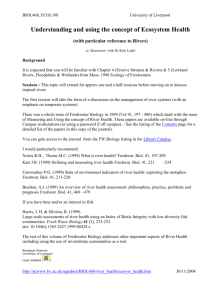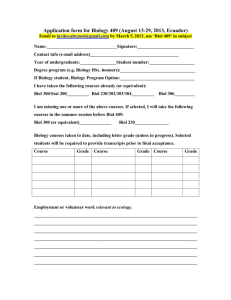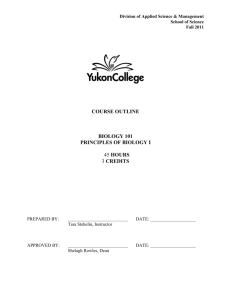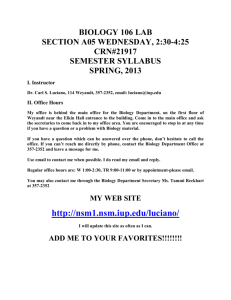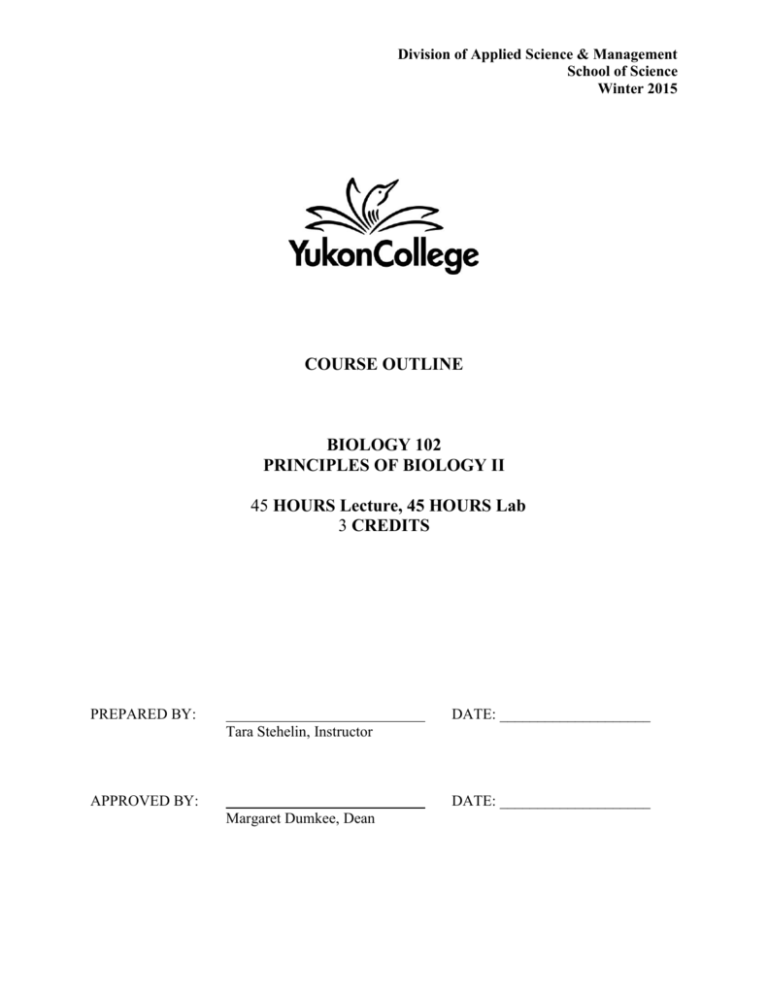
Division of Applied Science & Management
School of Science
Winter 2015
COURSE OUTLINE
BIOLOGY 102
PRINCIPLES OF BIOLOGY II
45 HOURS Lecture, 45 HOURS Lab
3 CREDITS
PREPARED BY:
DATE: ____________________
Tara Stehelin, Instructor
APPROVED BY:
DATE: ____________________
Margaret Dumkee, Dean
YUKON COLLEGE
Copyright December, 2014
All rights reserved. No part of this material covered by this copyright may be reproduced or
utilized in any form or by any means, electronic or mechanical, traded, or rented or resold,
without written permission from Yukon College.
Course Outline prepared by Tara Stehelin, December 18, 2014.
Yukon College
P.O. Box 2799
Whitehorse, YT
Y1A 5K4
DIVISION OF APPLIED SCIENCE AND MANAGEMENT
Biology 102
Credit Course
Winter 2015
BIOLOGY 102, PRINCIPLES OF BIOLOGY II
INSTRUCTOR: Tara Stehelin, B. Sc., M. Sc.
OFFICE LOCATION: A2806
E-MAIL: tstehelin@yukoncollege.yk.ca
TELEPHONE: 668-8898
OFFICE HOURS: Friday 11:00 – 12:30,
or by appointment
CLASSROOM: A2402 lectures A2805
labs
DATES and TIMES: LECTURES
Tuesdays and Thursdays 1:00 – 2:30
LABS: Wednesdays OR Fridays 1:00 –
4:00
COURSE DESCRIPTION
A continuing introductory course following Bio 101, emphasizing principles of wide application
to all living organisms, including processes of cellular reproduction and genetics, patterns of
inheritance, molecular biology of genes, animal form and function, plant form and function,
plant and animal nutrition, and form and functioning of the major organ and control systems in
living organisms, as well as principles of animal behavior. This course is part of core
introductory science, transferrable to most Canadian universities as a second-half of a
comprehensive first-year level Biology course. A comparative approach to the unity and
diversity of organisms is stressed. Mandatory lab sessions reinforce subject matter presented in
lectures.
PREREQUISITES
Admission to the Division of Applied Science and Management and successful completion of
Bio 101 (C- or higher), or permission of instructor. Math 12 (MATH 060, or equivalent) is
strongly recommended as a prerequisite, as well as a university-level math course as a corequisite. Students are expected to use basic mathematical skills.
EQUIVALENCY OR TRANSFERABILITY
This course transfers as first-year biology (one semester) to most Canadian Universities
Please see the BC Transfer Guide or contact the School of Science for more information on
transferability.
Examples:
UBC with BIOL 101, first-year Biol 111/112/140. (6 credits)
UVIC with BIOL 101, Biol 190A and 190B 210 + 220 (3)
UAF (University of Alaska Fairbanks)
Biol 106x (3)
UAS with BIOL 101, Biol 113 (3)
UNBC Biol 100 (3) Yukon Biol 101 & 102 = UNBC Biol 100 (4) & Biol (2) 100L
UR
with BIOL 101, Biol 100/101 (6)
TRU (Thompson Rivers University) Biol 1210
TWU with BIOL 101, Biol 113/114
SFU BiSc 102 (3)
UBCO(University of British Columbia Okanagan) With BIOL101, Biol 116/125
UFV (University of the Fraser Valley, formerly University College of the Fraser Valley)
With BIOL 101, Biol 111/112
VIU (Vancouver Island University) with BIOL101, Biol 121/122
LEARNING OUTCOMES
Upon successful completion of the course, students will be able to demonstrate understanding of
The process and the steps involved of cellular reproduction
mechanisms by which genetic traits are inherited
patterns of inheritance and DNA
physiological divisions of tissue and cell types, as well as an understanding of organ
functioning and organs systems in both plants and animals, including immunity,
endocrine control in both plants and animals, nervous control, and mechanisms of
homeostasis in animals
animal sensory systems, muscle systems, and
the ecology and evolution of animal behavior
Upon completion of mandatory lab sessions students will be able to demonstrate patterns of
inheritance, complete basic statistical tests on data, and demonstrate knowledge of the following:
vertebrate anatomy, principles of immunity, human health, blood components, kidney
functioning, animal behavior, and scientific process. Students will also be able to demonstrate
hands-on ability and understanding of detailed vertebrate dissection and lab protocol, including
safety. Students will also be familiar with components necessary in a full lab report.
DELIVERY METHODS
Material will be presented in two lectures and one lab session per week. Attendance in the
laboratory is mandatory. Students must pass the lab and lecture portions independently.
COURSE FORMAT
Three hours of lecture and three hours of laboratory time per week.
ASSESSMENTS
Attendance and Participation
ATTENDANCE POLICY
Attendance is mandatory in labs and greatly encouraged in lectures.
Absence from labs results in a zero grade assigned for assignments and quizzes relevant to the
missed lab. If the instructor is notified in advance of potential problems with attendance,
alternate work may be assigned.
Students must attend the laboratory session assigned to them upon registration, once per week.
Participation
Students are expected to participate actively in laboratory exercises, including taking part in
classroom discussions of results of exercises and experiments.
Assignments
LAB ASSIGNMENTS
Assignments are given during laboratory sessions and graded on the basis of understanding and
applying principles involved as well as the correctness of answers to solutions. Most students
finish assignments during the lab session, although they are not due until 12:00 noon the next
week day. A lab quiz covering material from the previous lab as well as some material from that
week’s lab will be given each during each scheduled lab (except the first lab) to assess progress.
Students are expected to read the material for that day’s lab before coming into lab.
Projects
None.
Tests
LECTURE
Quizzes/midterms on lecture material are given approximately once every two weeks. There are
5 quizzes in total, worth 10% each and a final exam worth 15% of the total mark. The final
examination will be held at the end of the term and cover material from the entire course, although
it will focus mostly on the last portion of material. The examination date will be announced as
soon as confirmed by administration.
LAB
Quizzes on laboratory material are given every lab session (except the first lab) and cover
material from the lab exercises the week before and from that day’s lab. There is no final lab
exam.
EVALUATION
On lecture material:
Quizzes (5) 10% each
Final exam
50%
15%
65%
On laboratory material
Assignments (12)
Quizzes (10)
17.5%
17.5%
Total
35%
100%
REQUIRED TEXTBOOKS AND MATERIALS
Urry, L. A., M. L. Cain, S. A. Wasserman, P. V. Minorsky, R, B. Jackson, and J. B. Reece. (2014)
Campbell: Biology in Focus. Pearson, Benjamin Cummings
ISBN-10: 0-321-81380-4; Pages: 1080
Available for purchase in the bookstore
Or
“Campbell Biology” 7th, 8th, or 9th Edition, Reece, Urry, Cain, Wasserman, Minorsky, and Jackson.
Pearson Benjamin Cummings
Lab Manual: assembled by instructor and handed out during first lab session.
PLAGIARISM
Plagiarism is a serious academic offence. Plagiarism occurs when students present the
words of someone else as their own. Plagiarism can be the deliberate use of a whole piece of
another person’s writing, but more frequently it occurs when students fail to acknowledge
and document sources from which they have taken material. Whenever the words, research
or ideas of others are directly quoted or paraphrased, they must be documented according to
an accepted manuscript style (e.g., APA, CSE, MLA, etc.). Resubmitting a paper which has
previously received credit is also considered plagiarism. Students who plagiarize material
for assignments will receive a mark of zero (F) on the assignment and may fail the course.
Plagiarism may also result in dismissal from a program of study or the College.
ACADEMIC ACCOMMODATION
Reasonable accommodations are available for students requiring an academic
accommodation to fully participate in this class. These accommodations are available for
students with a documented disability, chronic condition or any other grounds specified in
section 8.0 of the Yukon College Academic Regulations (available on the Yukon College
website). It is the student’s responsibility to seek these accommodations. If a student
requires an academic accommodation, he/she should contact the Learning Assistance Centre
(LAC) at (867) 668-8785 or lassist@yukoncollege.yk.ca.
TOPIC OUTLINE/SYLLABUS
WEEK
TOPIC
1, 2, 3,
Cellular Basis of Reproduction and Inheritance
. cell division, genetic inheritance
Quiz 1 Jan 22
. gene functioning
_____________________________________________________________________________
4, 5,6,7,8,
Biological systems, homeostatic processes
. Introduction to plant nutrition, animal nutrition
Quiz 2 Feb 5
. Gas exchange and transport in plants and animals
. Liquid Transport systems, plants, and animals
Quiz 3 Feb 19
. Immune systems of plants and animals
Reading Week Mar 16-20
Quiz 4 Mar 5
9,10,11
. Homeostasis of body fluids, liver, kidney function
Comparative control mechanisms
. Introduction to hormones: plants/animals
. Neurons, nervous system, brain
Quiz 5 Mar 26
. Sensory receptors
. Muscle function
. Behavior
Last class April 9th
Final Exam
LAB TOPICS AND SCHEDULE
Lab 1
Cellular Reproduction – mitosis and meiosis
Lab 2
Genetics, Mendelian patterns of inheritance
using Drosophila, introduction to a basic
statistical test, the chi-square
Lab 3
Plant Form and Function
Lab 4
Lab 5
Animal Form and Function-tissues, organs,
vertebrate dissection start
Digestive Systems-introduction to full lab
reports
Lab 6
Gas Exchange and Liquid Transport
Lab 7
Immune System
Lab 8
Homeostasis
Lab 9
Nervous and Muscular Systems, the brain
Lab 10
Animal Behavior – field trip to Yukon
Wildlife Preserve
This outline is subject to change prior to the start of classes.




